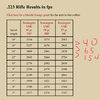Olon
Member
In fact, my "scribbling" says just that. If there's a "positive" net force you have positive acceleration. If there's a "negative" net force the opposite is true. Centuries of data confirm my conclusion 
So once a barrel heats up, the pressure may be just tiny bit more than the last shot, causing it to exit the muzzle at a higher speed. If you are unlucky enough to have a powder charge that exact to cause these kind of problems. There' s also the problem of a dirty barrel causing more force needed to travel down the barrel, which is a whole different subject. So may variables..See "1st and 2nd Law of Thermodynamics"
Perpetual motion machines are impossible outside an isolated system (for which there are none), and thus the same for a bullet traveling down a rifled bore indefinitely.
Gas leaks, friction, volume of space gas resides in expanding as bullet moves further away from explosion, etc. all lead to decay of force/energy acting on projectile.
So may variables..
As requested
Edit: conclusion state 3 should say insufficient, not sufficient and I apologize for reusing lowercase a. in F=ma it's acceleration and everywhere else it's the area of the back of the bullet.
That's for a bullet that's flat in the back as a curved one would involve more work and not add anything to the model.
That's not data. Data would show when the powder has burned 100% and the velocity of the bullet in the barrel before and after that point, showing that the speed of the bullet decreases immediately after the powder has burned 100%.
But there's also two undeniable facts.Haha that we can all agree on
For 9mm it looks like it’s about 17” for the loads they tested, they were slowing in the 18” barrel.
http://www.ballisticsbytheinch.com/9luger.html
Longer barrels will only yield more velocity If the pressure doesn't drop below what it takes to accelerate the bullet...

In my mind this handload tweaking is all about burning just the right amount of powder for the setup we are working on..
Simply put. I guess its darn near impossible to gauge whether a bullet is slowing down 2" from the muzzle.

Well it works for this guy, he got a couple of geese to show for it!!You can but it’s a destructive test, doing it the way BBTI does it.
FWIW really long barrels are used by some as a form of sound moderation. You only see them in shotguns because a wad has much less resistance going down the barrel than a lead much less jacketed bullet.
Some clams of noise emissions under 80 dB with just a longer barrel, less gas. At some point it exiting would sound like popping to cork on a whiskey bottle.
View attachment 820529
Talk about sight radius!

All you reloading scientists listen up!! I was just wondering if anyone could answer this question. Is it possible for a bullet to actually start slowing down by the time it exits the muzzle? If you were loading a minimal charge of one of the faster powders reccomend out of a longer rifle barrel, is it possible to loose acceleration if the powder is all burnt while the bullet is traveling down the barrel? You can imagine how much force it takes to hurl a bullet through the rifling. It probably sounds like a dumb question to more experienced reloaders, but I am fairly new and curious if it can happen. I ask this because if this were true, you could load in a tiny window that would give you random slow velocities if you were right on the edge of full powder burn. Reload gurus, enlighten me on powder burn and delta v.



View attachment 820546
I can even make it slow down and STOP halfway down the barrel.
The only thing I can't design . . is making it back up.
